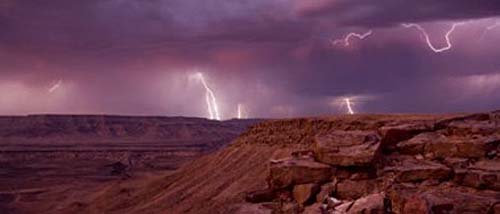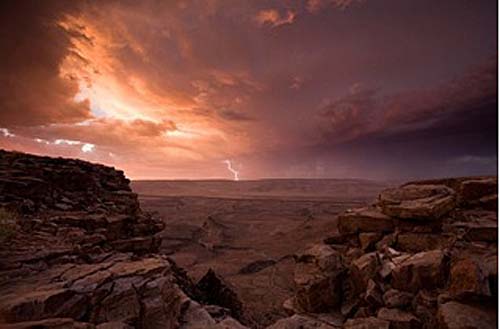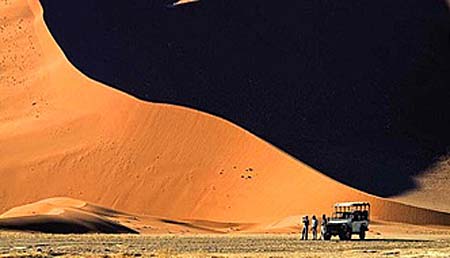This is part three in a three-part series. Read part two here.

The sat phone battery dies. We slip in the spare. Louis connects with a neighbor who finds the number of a helicopter pilot in Windhoek, and we dial through. He says he would try to find a chopper, and that we should get back to him with our coordinates. But, our GPSs had been sent around to camp. So, we describe our location....five miles up from the confluence with the Fish River. That isn't good enough, he says, as it will be a three hour flight from Windhoek, and it will be dark soon. The pilot says he might try a midnight rescue, but would prefer the coordinates before an attempt. Louis says he will get back. The second battery is almost dead, probably enough for one more call. So, Louis decides to call his mom, and ask her to find the coordinates on a map, and then call the pilot. But as soon as he gets Gerty on the phone, she starts to chatter, dominating the conversation. "Shut up mom, and listen," Louis yells into the phone...but it goes dead.
It has gone almost dark, and the river below runs copper, like an ember alone on the hearth. It is hard to pick our way down the talus to where Seth lays waiting in a heat-drugged stupor on his abandoned stretcher. Tim Cahill, Jim, and Pasquale have stayed behind while the rest of the group headed for camp. Even though the shutters of the day are nearly closed, Louis volunteers to head down the canyon, as he knows the way and can then take a vehicle to his lodge where he can use a landline to coordinate...if he is lucky, he will arrive by midnight.
So, Louis borrows a pair of socks from Pasquale, and strikes out into the night. Letting Louis go is like throwing away the compass, an act of shared self-marooning. We are on our own now, five Americans and our day packs in the pit of an African canyon, distant and unconnected from the world.
We figure we will make a series of campfires, and use our flashlights to wave in the helicopter if it makes the midnight run. Tim, Pasquale and Jim pick through their packs to look for matches, but can't find any. Not to worry, as I have a stash in my pack. But when I go to fetch my pack, it is nowhere to be found. I retrace my route back up the canyon to where Seth was laying using my pack as a pillow, but there is no sign. Somehow the group hiking to camp must have picked up my pack, leaving me with nothing but the shorts and shirt I am wearing. Another layer gone.
We move Seth to a level spot in the lee of a large granite rock far up from the river, near a cluster of sacred datura. Since we can't make a fire, we spread out on the sand and watch the stars and talk. I recount a Danish Dogme film recently seen, "The King is Alive," with Jennifer Jason Leigh, in which a group of tourists gets lost in the Namibian desert, and decides to put on a performance of King Lear to distract from their fates. Pasquale regales with stories of his White House visit after climbing Everest. Down by the river the frogs start to sing, and Seth moves into a remarkably good mood, helped in part by the 2 mg tablets of Dilaudid he finally swallowed. He tells brittle jokes, then ponders his own catalogue raisonne, his life's meshings and unmeshings. Fireflies spin about, and every now and then I lift my head to see if one of the bugs is really an approaching rescue light. About 11:00 we stop talking. Jim next to me is snoring. I curl up in a snail circle and watch the silver pinpoints of the Southern Cross.
An owl swoops over our makeshift camp. Then a dry, warm wind begins to scuffle up the canyon. At first it is just a breeze, and its night smells seem to wash us clean. But it grows and I can feel the sting of grains on my cheeks. It begins to blow away the stars, lightening flashes in the distance, and there is that indefinable smell of tension that precedes rain. I stand up, grit my teeth. "A storm's coming. No helicopter tonight."

I check on Seth, shine the flashlight on his face, and he looks scared. He has a prison pallor and a web of hairline cracks around his eyes. "What about a flash flood?" he asks. "Nah, not here...the canyon is too wide," I lie. Then I look about for a flat spot up the sheer walls where we might reposition Seth...there is nothing.
The unit of exchange here is a full quart of water, and we're low, so I step down to the bank of the river and pump filtered water into all the bottles, come back and distribute them to the bodies lying in the sand. Then I notice a series of caves just above our roost, and borrowing a flashlight step up to check them out. They are tiny, tortured holes, with flinty, sharp-edged rocks as the floor, littered with rat turds. These are probably dens of scorpions, spiders, snakes, blister beetles, and other toxic creatures that have pushed the envelope of adaptability, but they are also shelters from the hostile wind, and a couple are just big enough to squeeze into.
So, back I go, check the tarp that is rolled around Seth, and announce I am retiring to the cave to weather the storm. It is kicking into high gear, and sand is racing along the black earth like rapids, spraying us like BBs, blasting a layer off my skin. "I've got sand up my urethra," Seth yells. Tim Cahill sacrifices his space blanket to Seth, and wanders up to the cave next to mine. Jim sits up against a rock next to Seth and covers himself in two large Glad bags, one up to his waist, the other over his head and shoulders.
I bend into my cave like a street artist folding into a box. Pasquale finds an upper entrance and twists in above my head. Then the skies open; the rain comes down hard. Lightning flashes, thunder rolls. The wind begins to make a singular, animal-like howl, and the rain is so loud it sounds like a freight train coming. "No," I say to myself. "It can't flashflood here....or could it."
"Dude," Pasquale mutters. But he's talking in his sleep.
I have a clear view of Seth where I am croutched in the cave, and the flashing light makes his wrapped form look like a catafalque beneath the grey monument rock. I wait until there is a lull in the rain, then unfold myself, borrow Pasquale's flashlight, and venture out into the sand-laden wind to check on Seth. "You okay?"
"Are you kidding?" He says in a feeble voice, grinding sand between his teeth. "Two broken ankles, sandstorms, windstorms, lightening, thunder, rain, flashfloods. What's next, locusts?"
I laugh into the talons of the wind, and stumble down to the river to see if my flashflood nightmare might be coming true....but no, the river has barely changed. I breathe a sigh, and head back to my cave.
Once curled back inside, lying on a bed of broken rocks, the ceiling an inch from my head, Pasquale's foot on my neck, I draw my feet up into a fetal position, and listen to a tree outside creaking like an old rope. At least it's dry, I think. But then the cave begins to leak, and rivulets of rainwater pour onto my neck, thighs and exposed legs. Another round of lightening and long, trembling salvos of thunder, and I close my eyes for a minute. The wind outside seems to celebrate a dark sensation of having attained a new depth of misery. But then I recognize that despite the travails and Seth's misfortune, I am realizing some sort of explorers solace. Stripped of all my layers; decocted down to an essence, it feels somehow comfortable and real; life is here, not through a window or on a screen. And there is a sense of being unbounded by geography or history. Not reconciled, not resolved. Not free of fretting about Seth. But free of trappings. And if accessories are a species of idleness, then free of sloth. And then I fall asleep.
In the pale, infected light of daybreak I unfold from my cave, and shake my head as sand scatters out. My mouth and throat feel made of tin. The air, doubly still now after the departure of the storm, is like something drawn up from a well, fresh and cool. I step down to Seth's stretcher. His face is cracked, like a crocodile's belly, with dust rings around his eyes. There is no helicopter. No rescue party. "That was the worst night of my life, bar none," Seth offers, and he has spent a career traveling to hardship posts. "You didn't have it so bad," Pasquale quips. "My cave was so small I had to go outside to change my mind," and Seth manages a smile.
"What do we do now?" Seth asks, his voice sounding small in the immense morning air. "I don't know if I can take another day of this heat."
"We wait. Someone will come soon." Already I feel the heat on the back of my neck.
Minutes later we look across the river to see some sort of mechanical monster working its way down a mesa. With binoculars we see it is Louis's Unimog, a relic of the South African border war. It grinds to a stop several hundred feet up the canyon, and Louis hops out and sprints on down to the river, then crosses over to us. "Where's the chopper?" I ask. "I don't know. Never made it back to the lodge last night. I just slept a bit, grabbed the truck at camp, and worked my way here."
An hour later a black cormorant near our camp starts into the sullen sky. Then suddenly a Bell Jet helicopter whooshes up the canyon. Louis starts to cry. But it continues up-canyon, apparently missing our waving red jackets and space blanket. Around a bend it vanishes. The canyon fills with a roar of nothingness. Did the pilot give up on us? We wait three minutes; five; ten and begin to vex. The desert seems to have inhaled and is holding its breath. But then a sound splits the silence into fragments: a distinctive whop, whop, whop pours down the gorge. After a couple passes the helicopter makes a landing, almost 20 hours since the accident. Eddie, a medic wearing a flight suit stitched with a logo that reads "Nam Power," hops out, hustles to Seth and takes control with seigneurial assertion. He pulls out an aluminum split, and to the great relief of Tim Cahill, replaces the notebooks that had supported the left ankle. Minutes later we are saying goodbye, and the chopper lifts from Seth's battlefield to the meadows of some hospital. Then Lisa and Peggy show up, having hiked down from the rim with food and supplies. And we resume our hike to camp where tents and cold beer await, putting back the layers, heading back toward whence we came. But for a moment I understand the appeal of this place to Angelina and Brad. Here we were as real, as honest, as uncluttered and uncomplicated as one can be, clean and close to our beginnings, and ready to go forth.

Photo from MTSobek